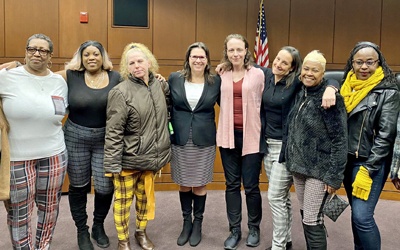‘Beating Heart’ of Law School: Clinical Law Program Has Been Making a Difference for 50 Years
August 09, 2023 Wanda Haskel
Read about how the program continues to address Baltimore’s severe lack of access to justice for disadvantaged and underrepresented communities in the latest issue of “CATALYST” magazine.
Fifty years ago, scholars and students at the University of Maryland School of Law saw a need to address Baltimore’s severe lack of access to justice for disadvantaged and underrepresented communities. Fueled by this desire, the law school established its Clinical Law Program, allowing it to tackle that need while building experiential learning, driven by sound theory and doctrine, into law students’ training.
“The Clinical Law Program is the beating heart of our law school,” said Francis King Carey School of Law Dean Renée McDonald Hutchins, JD. “The work of our clinics represents our deep commitment to providing access to justice in our city and to the integration of theory and practice woven into the curriculum.”
The program, one of the first of its kind in the nation, has flourished since the early 1970s, as has the law school’s national reputation for the breadth, diversity, and impact of its clinical courses and for the excellence of the clinical faculty.
A primary reason students cite for attending Maryland Carey Law is the opportunity to begin making a difference before they even graduate. Alumni also laud their clinic experiences for providing the skills and tools to hit the ground running when they began practicing after graduation.
“My first time in court is one I will never forget,” said Isabella Datillo, a Class of 2024 student in the Medical-Legal Partnership Clinic. “Without the clinical program, I would not have gotten such robust, real-life legal training that also allowed me to help a member of our community.”
Honoring the Past
Maryland Carey Law is celebrating the anniversary of the Clinical Law Program with the investiture of the program’s co-director, Leigh Goodmark, JD, as the Marjorie Cook Professor of Law and a symposium focused on the role of law school clinics in helping reduce prison populations. An event in the fall will explore the future of clinics in legal education.
The program has grown from one clinic in 1973 to the 18 today. Its roots reach back to the civil rights and legal services movements.
Peter Smith, notable for having argued before the U.S. Supreme Court in the 1969 landmark case Shapiro v. Thompson, which ended residency requirements for welfare, directed the first clinic, giving students the chance to represent children in Baltimore’s juvenile court.
From that propitious start, the program took off, expanding in the next two decades with the leadership of faculty who launched clinics in areas such as disability rights, health, elder law, bankruptcy, consumer protection, environmental law, and mediation, as well as one of the first AIDS legal clinics in the country and a groundbreaking interdisciplinary law and social work clinic.
“From the beginning, our law school has been a recognized leader in clinical education and ahead of the curves in developing a comprehensive clinical program, requiring our students to take at least one experiential course, and integrating theory and practice,” said Michael Millemann, JD, a former program director and a leader in creating the program. “We have had the full support of six deans and all faculties since 1973, and great clinic leadership. We have only gotten better over the decades.”
Read more about the law clinic's work in the spring issue of CATALYST magazine.
You can read the Spring 2023 issue of CATALYST magazine, which highlights the work of the University's women deans; the School of Medicine’s research to fight malaria; the School of Nursing’s partnership with Enoch Pratt Library to offer health care; the Graduate School’s new MS in Diversity, Equity, and Inclusion Leadership; UMB’s sustainability efforts to install beehives; and much, much more!
Photo: Leigh Goodmark (center wearing black), the Clinical Law Program’s co-director, poses with clients in the Maryland Carey Law Moot Courtroom.